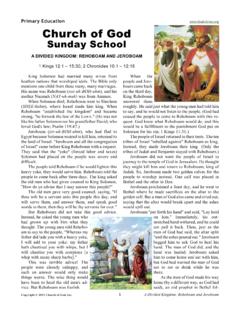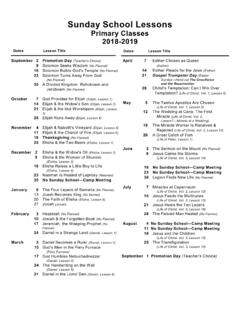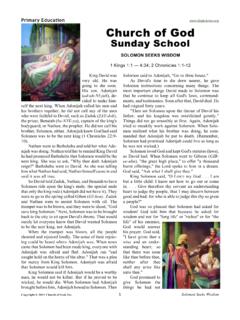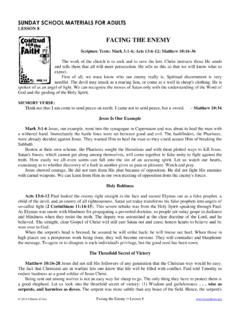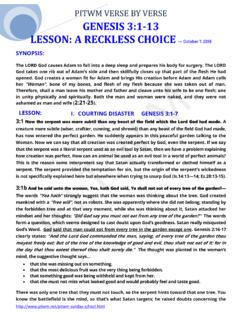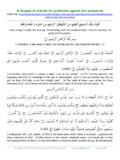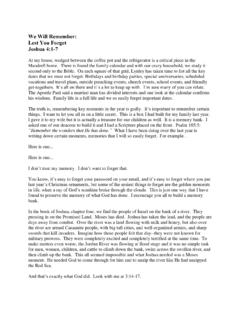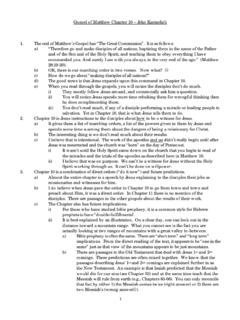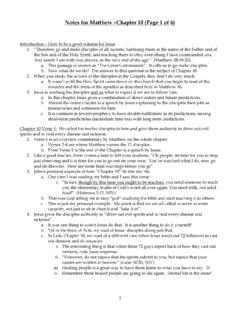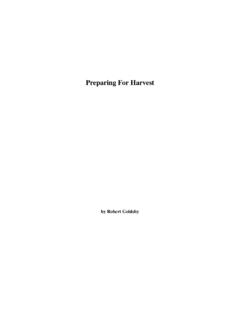Transcription of www.GodsA cres. org Church of God
1 Youth Lessons Church of God Sunday School THE BIBLE THE LAW. DAILY READINGS : Monday: The first commandment is broken (Genesis 3:1-6). Tuesday: God gave the Ten Commandments (Exodus 20:1-17). Wednesday: God will not accept unholy worship (Leviticus 10:1-7). Thursday: Israel's unbelief brings punishment (Numbers 14:30-34). Friday: The Law was a glimpse of good things to come (Hebrews 10:1; 8:6). Saturday: God's laws are written in our hearts (Hebrews 10:16-18). MEMORY VERSE: "Wherefore the law was our schoolmaster to bring us unto Christ, that we might be justified by faith. But after that faith is come, we are no longer under a schoolmaster." Galatians 3:24-25. The Law of Moses PRONUNCIATIONS. The first five books of the Old Testament are commonly called "The Law," "The Five Books of Moses," and the "Pentateuch" (which means five Pentateuch (P EN-tuh-took ).)
2 Volumes). In the Hebrew language these books are called the "Torah" (which means the law, or instruction). Joshua called them the "book of the law of Decalogue (DEK -uh-log). God" (Joshua 24:26); Judah was taught from the "book of the law of the LORD" (2 Chronicles 17:9); Jesus called them the "law" (Matthew 12:5); Luke said it was the "law of the Lord" (Luke 2:23); and Paul talked about the "book of the law" (Galatians 3:10). Although it is not for certain, the author of these five books is commonly thought to be Moses. We know that at least a portion of these were written by Moses, because Scriptures refer to the "law of Moses" (1 Kings 2:3; Luke 2:22) and to the "book of Moses" (Mark 12:26). It is believed that Joshua wrote the last part of Deuteronomy, describing the death of Moses. Five Books of the Law G ENESIS: the very first book in the Bible is a book about beginnings.
3 There we read of the beginning of the world, people, sin, civilization, marriage, languages, and nations, including the nation of Israel from which the Savior of the world would be born. We do not learn about God's beginning in this book, because God has no beginning or ending; He is eternal. In Genesis we read of the first commandment God ever gave to man (2:17). Genesis answers the question, "Where did I. come from?" and it lays the foundation for the rest of the Bible. This is why atheists and evolutionists work so hard to disprove the stories of Genesis. If they can prove that Genesis is untrue, then the rest of the Bible could be discredited as well. E XODUS: the name of this second book means "going out" or "departure." The story of how God delivered His people from Egyptian bondage is not only a historical account of the nation of Israel, but it also helps people to understand the story of redemption that came in the New Testament.
4 Jesus set every sinner free from the bondage of sin through His death on the Cross. This book also contains the many laws (or commandments) God gave to His people. One well-known set of those laws is the Ten Commandments, sometimes called the "Decalogue" (which means ten words or sayings). L EVITICUS: the third book contains commandments for the Levites (priests) concerning worship, sacrifices, and offerings to the Lord. It also contains commandments to the people concerning their worship and their everyday living. God is a holy God who wants His people to be clean and separate. He gave these laws so that His people would know the difference between clean and unclean, between holy and unholy. At first, Leviticus might seem like a hard book to read, 2013 The C hurch of God, Inc. 1 The Bible The Law Youth Lessons but without this book and its laws, we could never fully understand the final and ultimate sacrifice Jesus made at Calvary.
5 N UM BERS: the fourth book is also known as the "Book of the March" or "Roll Call." The Hebrew title is "In the Wilderness." In this book you will read how Israel wandered in the wilderness for 40 years because of their unbelief. Twice a census (numbering) of the Israelites is recorded in this book: before leaving Mt. Sinai (Chapter 1) and before entering Canaan (Chapter 26). When reading this book you will learn that God hates sin and that there is a punishment for sin. But you will also read of a God who is faithful and who is patient. D EUTERONOMY : the last book of the Law is also called the "Second Giving of the Law." In three separate speeches, Moses told the people of Israel to remember the commandments given by God to His people. The last part of this book is a description of the death of Moses. Jesus quoted the words of Deuteronomy 6:4-5 when He answered a scribe in Mark 12:29-31.
6 Also, the Ten Commandments are restated in Chapter 5. The Importance of the Law God placed great importance on His people knowing the commandments He had given in these five books. Over and over they were told to "remember." God told parents to teach His laws to their children and to their grandchildren. "This book of the law" was to be kept in the Ark of the Covenant (Deuteronomy 31:26). Many times Israel came together to hear the Law read aloud (Joshua 8:34-35;. Deuteronomy 31:9-13; Nehemiah, Chapter 8). Every king of Israel was to write out a copy of the Law and also to read it "all the days of his life" (Deuteronomy 17:18-19). God's people were commanded to write God's laws on the doorposts of their houses and on their gates (Deuteronomy 11:20). Why do you think God put such emphasis on hearing and knowing His commandments?
7 Moral, Ceremonial, and Civil Laws When you read the Pentateuch, you will find different kinds of laws. Some might seem strange, but it is important to understand why they were given at that time. The Mosaic Law (Law of Moses) can be divided into three parts: moral law, ceremonial law, and civil law. There are people who believe we should obey all of these laws still today, and then there are people who say we do not have to obey any of it because it is the old Law. Are either of these opinions true? M ORAL L AWS: these laws reveal God's character. They are a reflection of who He is. Moral laws are unchanging just as God is unchanging (Malachi 3:6). When Adam and Eve disobeyed, when Cain killed Abel, when Jacob lied to his father all these are examples of God's moral laws being broken. The moral laws are incorporated within the Mosaic Law (example: the Ten Commandments), but they were in effect long before Moses wrote them down.
8 We can find God's moral laws restated in the New Testament. These laws are for everyone (not just the Jews). C EREMONIAL L AWS: these laws were given to prepare people to worship a holy God. God gave these laws so that His people would be separate, pure, and clean (ceremonially). These laws include commandments about sacrifices, being clean and separate, and the institution of remembrance feasts and festivals. When Jesus died on the Cross, He became the Ultimate Sacrifice. It is through Him that we are clean and pure (not through ceremonial cleansing). These laws were temporary; under the New Covenant they were fulfilled in Jesus (Matthew 5:17-18). C IVIL L AWS: these laws were given to govern the nation of Israel. They included punishments for people who broke these laws. Today, God's people live in many different nations, under different forms of governments.
9 We are not bound by the civil laws that were given for Israel. Why Was the Law Given? In Greek society families often had a slave who was in charge of supervising the master's children. His duties were to make sure the children went to school and did their homework. This slave would also make sure the children knew manners and social customs. The children could be disciplined by this slave when necessary. Yet, the slave was not the teacher. No doubt Paul was thinking of this when he wrote that the "law was our schoolmaster to bring us unto Christ" (Galatians 3:24). Christ is the Teacher; the Law could only bring us to Him. We needed the Law to make us aware of our need of a Savior (Romans 3:20). The Law was merely a shadow (a rough outline) of what was to come (Hebrews 10:1). Under the New Covenant we do not need God to write His laws on tables of stone (as the Ten Commandments were).
10 Nor are we commanded to write them on the doorposts of our houses. The Holy Spirit will write God's laws in our hearts and in our minds (Hebrews 10:16). The Old Covenant only brought guilt and punishment, but under the New Covenant we can find love and forgiveness. 2013 The C hurch of God, Inc. 2 The Bible The Law Youth Lessons 1. The Ten Commandments were written on two tables of stone. It is believed that the first four commandments were on one table and the last six were written on the other. The first four describe man's duties to The last six describe man's duties to 2. Read Leviticus, Chapter 11. List some of the animals that were considered unclean: 3. The Ten Commandments have become the foundation of all the law in the Western world. Name one commandment that is a part of your country's laws: 4. Fourteen months after leaving Egypt, the first census (numbering) of Israel took place.



